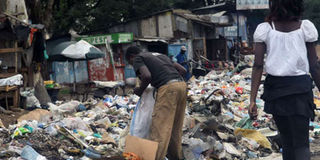Discipline is a national imperative for development

A man sorts out garbage at a dumpsite on Juja Road, Nairobi, on January 9, 2018. One drawback in development of Kenya and Africa is our insensitivity for our environment. PHOTO | ANTHONY OMUYA | NATION MEDIA GROUP
What you need to know:
- Nations that have progressed apply the law blindly to everybody irrespective of their status.
- The President must be vigilant in the management of our resources and invest where we shall realise most impactful growth.
Nations that have positively impacted the lives of their citizens have common characteristics — whether it is Singapore, South Korea, Japan and China in the East or Switzerland and Germany in the West.
The distinguishing factor is the high level of discipline they bring to bear on whatever they do in production of goods, services and their breakthrough in science and technology fields.
Above all, basic things like their strictness in keeping time, observing meeting deadlines and cleanliness have in no small way contributed to phenomenal economic growth.
In Africa, however, there is no nation that is a shining model to which we could look upon as a development index. Why?
Largely because of poor work ethics and failure to keep time.
ENVIRONMENT
We tend to believe there is always time left for us to play about.
We make wrong assumptions by blaming the environment, ignorance and culture for our failures.
But, as evidenced in Why Nations Fail: The Origins of Power, Prosperity, and Poverty, a book by academics Daron Acemoglu and James Robinson, these and other criteria cannot stand the test.
The authors have explained through sound and painstaking research the origins of power, prosperity and poverty in a manner that challenges our policy makers and scholars to aggressively interrogate the veracity of their findings.
One drawback in development of Kenya and Africa is our insensitivity for our environment and the indifference to the value of time keeping.
This is manifestly clear when we closely observe our villages, estates, towns.
TIME WASTAGE
We see heaps of garbage, for example, as normal despite the attendant consequences of environmental degradation and diseases.
When it comes to the question of time, many times — even in official meetings — things run behind schedule.
The knock-on effect is tremendous loss of time and the first victim is productivity and setting in of mediocrity that becomes normalised.
Jubilee’s 'Big Four Agenda' – manufacturing, healthcare, food security and affordable housing – outlined by President Uhuru Kenyatta are likely to remain lofty dreams unless there is an appreciation of the sense of urgency and the President leads by example.
I have reservations as I am yet to see a difference from the past in the way things are done, particularly with respect to discipline, time, and accountability.
STRONG LEADERSHIP
To achieve the agenda, we must, for example, ensure our manufactured goods meet international standards for both the discerning local and foreign consumer.
Similarly, housing, food and health will not happen without observance of strict discipline.
The President has to set very high standards reminiscent of the likes of General Park Chung-hee of South Korea, Lee Kuan Yew of Singapore or the post Mao Zedong Chinese leaders who adopted focused, firm and no-nonsense leadership in the transformation of their countries.
However, there are a number of likely impediments.
A major one is the culture of entitlement, especially among many politicians from both sides of the divide and some in the younger generation.
RULE OF LAW
The President has to take tough decisions to achieve “business unusual”, to quote him.
He must be vigilant in the management of our meagre resources and invest where we shall realise most impactful growth.
The other impediment is the emerging internal rebellion, where sections of society are becoming increasingly lawless.
Yes, we have freedoms but the expectation is that these are underpinned by a sense of responsibility.
We need to ensure that law and order enforcement is not taken for granted but must be applied to all.
Many times we say that nobody is above the law but that has become more of a cliché than reality.
This portends an environment where anarchy could reign supreme and ultimately no-one gains.
Much worse, we risk creating two societies of those who obey the law and the lawless.
CORRUPTION
The final impediment is corruption and general indifference to civilised adherence and respect for the rule of law.
The President is the only one who has the instruments of power to decisively lead the fight against this dragon.
Kenyans will be behind him where he is resolute in holding all public and private sector players to account.
Besides, his party, Jubilee, has the numbers in Parliament to pass legislation to limit the period within which corruption cases can be dispensed with at the trial, acquittal or conviction.
Election petitions are dispensed within six months, why not crimes that threaten the very fabric of the nation?
Nations that have progressed apply the law blindly to everybody irrespective of their status.
We are not different from those nations that aspire to reach their height of potential unless we pack the country called Kenya in a suit case and take it elsewhere outside the present world.
The writer is an Advocate of the High Court; [email protected]





